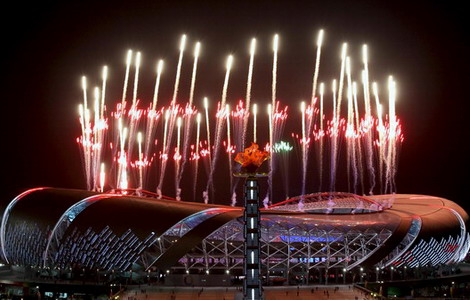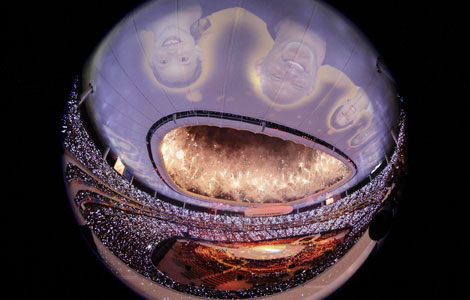Emotions high ahead of Israel-Hamas prisoner swap
Updated: 2011-10-17 03:44
(Agencies)
|
|||||||||||
JERUSALEM? - This week's planned Mideast prisoner swap is unleashing deep anguish in Israel and widespread elation in the Palestinian territories, laying bare the chasm of perspective dividing the two sides.
In Israel, the public is aghast at having to release convicted perpetrators of suicide bombings, deadly shootings and grisly kidnappings, although most understand that's what it takes to win freedom for a soldier captured during a routine patrol inside Israel at age 19.
The Palestinians, with equal vehemence, see the returnees as heroes who fought an occupier at a time of violence and argue moral equivalence between their actions and those of Israel's army.
These diverging narratives have been reflected in reactions to the deal, in which Israel will free some 1,027 Palestinian prisoners in exchange for Sgt. Gilad Schalit, captured by Gaza militants in a cross-border raid in June 2006.
Shalom Rahum, whose 16-year-old son Ofir was lured over the Internet to the West Bank by a woman and killed, said her release was reopening a painful episode.
"Our little consolation was our bit of justice," he said. "If there were a peace treaty, I'd say ... release all the prisoners because we are opening a new page. But we are not signing a peace treaty," he told Israel TV.
Following initial joy over the deal, Israelis have begun to ask questions about the lopsided price their government is paying. Many argue that militants who killed Israelis could return to armed activity and that releasing so many prisoners, including many implicated in deadly attacks, bolsters groups like Hamas at the expense of more moderate Palestinians.
To address Israeli security concerns, Hamas agreed to have more than 200 West Bank-based prisoners deported to either the penned-in Gaza Strip or to a third country, where it would be much harder to carry out attacks.
While Israel has a long history of lopsided prisoner swaps, the Schalit deal has touched a nerve because memories of the attacks are so vivid. The list of prisoners who are being released reads like a who's who of perpetrators of some of the grisliest attacks of the second Palestinian uprising, which began in 2000 and lasted roughly five years.
They include the woman who directed a suicide bomber to a crowded Jerusalem pizzeria where he killed 16 people in 2001. The woman, Ahlam Tamimi, has said in a television interview that she has no regrets.
Others on the list are Abdel Aziz Salha, who raised his bloody hands to a cheering crowd after killing two Israeli soldiers who accidentally drove into the West Bank city of Ramallah in 2000; Nasser Yateima, a mastermind of a hotel bombing that killed 30 people celebrating the Passover holiday in 2002; Ibrahim Younis, who planned a 2003 suicide bombing in Jerusalem that killed seven people, including an American-born doctor and his daughter who were celebrating on the eve of the young woman's wedding; and Fadi Ibrahim, the mastermind of a bus bombing in 2003 in the northern city of Haifa that killed 17 people.
Several families have filed court appeals against the prisoner swap, though that is not expected to halt the deal.
Ron Kehrman, whose daughter was among the victims in the Haifa attack, criticized the planned swap, saying it could result in more Israeli deaths. "Is the blood of the next captured soldier or citizen less red than the blood of Gilad Schalit?" he asked.
Other bereaved relatives were more accepting, acknowledging that Israel at least has a chance to bring back Schalit alive. Schalit's fate has become a national obsession, in part because military service is mandatory for Israeli Jews.
Among Palestinians, there is ongoing disagreement over whether the use of violence has been counterproductive in the quest for statehood. Recent polls indicate that support for attacks on Israelis has dropped since the uprising ended.
But even those opposed to violence on tactical grounds argue that the prisoners sacrificed for a common cause, and the Palestinians have the right to resist Israel's 44-year military occupation, even with what many elsewhere consider terrorist attacks.
Palestinians are quick to note that hundreds of Palestinian civilians have been killed in fighting with Israel as well, usually the result of "collateral damage" during military operations, such as targeted killings of militant leaders. Although Israel says it never intentionally targets civilians, Palestinians say civilian deaths are almost inevitable given the nature and locations of targets.
"It's a debate that will never end," said Kadura Fares, a Palestinian prisoners' rights advocate who himself spent 14 years in Israeli prisons for belonging to an armed group before emerging as an outspoken proponent of coexistence.
"An Israeli army officer, from our point of view, he is a terrorist if he gives orders to kill people or bomb certain areas. For Israelis, he is a hero," Fares said.
Fares said bombers or gunmen should not be held personally responsible for their actions because they were swept up in the atmosphere that prevailed at the time.
The issue of the prisoners is deeply emotional in Palestinian society, where virtually every family counts a member who has spent time in an Israeli prison. Israel says it is currently holding more than 5,000 Palestinian prisoners for crimes ranging from theft to infiltrating Israel illegally for work to carrying out deadly attacks.
In Gaza and the West Bank, Palestinians were preparing a hero's welcome for the returning prisoners.
Palestinian President Mahmoud Abbas — largely sidelined during the swap negotiations between Israel's government and Hamas, his political rival — was planning a reception for released prisoners Tuesday, said an aide, Saeb Erekat.
The swap has dealt a setback to Abbas, who has long favored a negotiated peace deal with Israel. The implicit message of the deal to the Palestinian audience is that Israel will more readily make concessions under pressure than in negotiations with Palestinian moderates.
A Hamas leader in Gaza, Mahmoud Zahar, told the Israeli daily Yediot Ahronot in an interview published Sunday that the swap deal for Schalit will encourage the Islamic group to capture more soldiers.
"The lessons we've learned by kidnapping soldiers leads us to continue the kidnappings," the Hamas leader said.
Hot Topics
Libya conflict, Gaddafi, Oil spill, Palace Museum scandal, Inflation, Japan's new PM, Trapped miners, Mooncake tax, Weekly photos, Hurricane Irene
Editor's Picks

|

|

|

|

|

|







